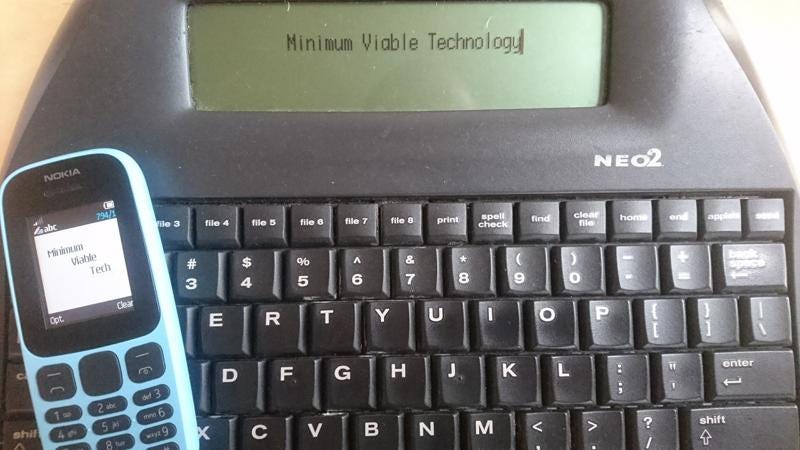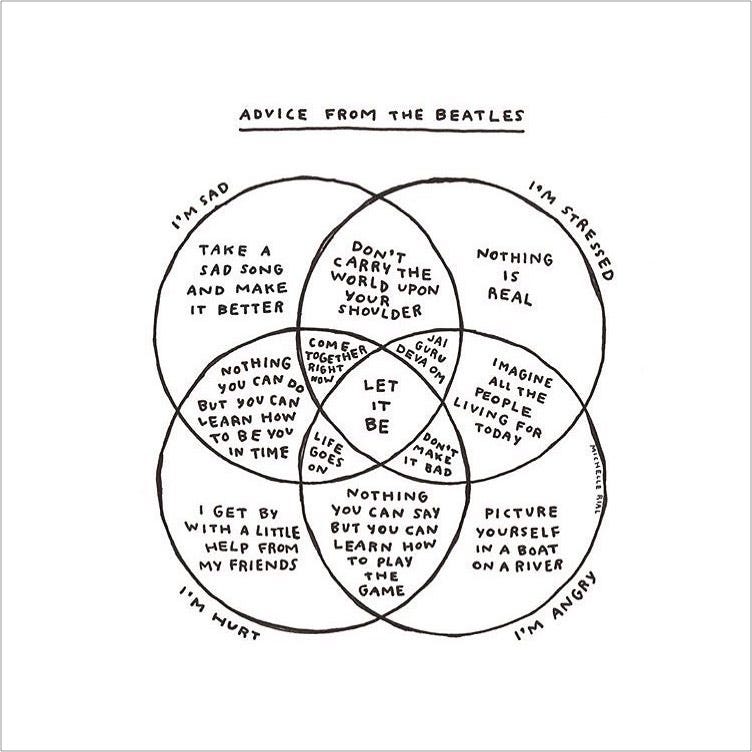#105: I believe in Minimum Viable Technology

My minimum viable phone and minimum viable word processor.
Happy Friday!
This week I believe in Minimum Viable Technology
Dear Reader,
After writing this week's 1,500 word piece on Minimum Viable Technology, I suffered a crisis of confidence and got worried that:
You will get annoyed at me for preaching about using more simple technology while simultaneously sharing my writing over an extremely complex technology - and forcing you to use said technology in order to read it.
Some of you will think technology is boooooring.
So if you'd like to read the full piece about the wonders of Minimum Viable Technology, go on and head over to my blog.
For the rest of you, here are some select snippets in an easily digestible format that won't waste too much of your time. Onward!
How many devices have you looked at this morning?
I'm on seven.
I checked the time on my bedside travel clock
I listened to a comedy on my DAB radio
I used a stopwatch to time my press ups
I wrote my diary using a typewriter
I sent a text message on my feature phone
I did some yoga using an app on my smartphone
I typed these words into a computer
You'll note that all of these tasks could have been accomplished using only one tool: my smartphone.
So why have seven devices when I could have only one?
Because I believe that simple single-purpose technology offers significant advantages over complex multi-purpose technology like the smartphone.
These advantages can be summarised with the principles of what I pompously call Minimum Viable Technology.
What is Minimum Viable Technology?
Rather than starting out with what the tool can accomplish (Ooh! Look, it's a clock and a radio and a stopwatch and a phone and a camera AND a yoga teacher!), the principles of Minimum Viable Technology first define what you want from life (Bleeurgh, what's the time?), and then find the simplest tool to match (a bedside travel clock).
Principles of Minimum Viable Technology
Clearly define the single task at hand
Use the least complex tool that still fittingly accomplishes that single task
Stop. Adding. Features. Goddamit.
So what are these much-vaunted advantages?
Focus. A bedside travel clock does only one thing and will never invite you to chat to your cousin in North Carolina or offer to help you learn yoga.
Quality. The best multi-purpose technology will never be superior to the best single-purpose technology. Think of the difference between the cutting edge of a Swiss Army knife and a chef's knife; or between the photographs taken by an iPhone and an SLR.
Waste. The principles of Minimum Viable Technology tend towards a lower environmental impact and less waste, although this is by no means guaranteed: my 7 devices will all end up in land-fill :(
Skill. The more basic the technology, generally speaking, the greater the skill you must learn and deploy.
With all this in mind, I think we should flip the question: Why have only one device when I could have seven?
Side Bar: It's not all about 'devices'
Technology is everything humans have ever invented to try and make our lives easier, from agriculture and money, to shampoo and footwear.
Rather than depending on complex multi-purpose tools for everything, I believe that we should use them as 'catch-all' technologies to mop up the functions that are either unimportant to us, or we simply haven't had the courage, the time, the money or the wherewithal to replace yet.
A yoga teacher would be vastly superior to the app on my phone, but I'm just not dedicated enough to make the switch. Likewise, I don't care enough about photography to buy an actual camera.
And so we come to the chameleon of the personal computer.
I wrote a line to myself recently: A computer is not a crutch. And yet that is exactly how I treat it.
My computer is my workstation and playstation combined. It is my portal into the world, and the screen through which I peer. It is the medium of my creativity.
I know that my life could benefit from applying the principles of Minimum Viable Technology to those moments when I turn to my computer screen.
What do I want from life right now? It's probably not to stand here typing, reading on a screen, or replying to emails.
This computer is so far from being a Minimum Viable Technology that it's actively keeping me from being the person I want to be.
Woah.
I'll see you outside!
Further Technologies
If you're into more of this sort of thing, then obvs read the full blog post as well as the following morsels:
Minimum Viable Technology (6 minute read). The tool is not the task. In our search for the most efficient technology, we forget that 99% of a task is not about the tools we use. Cleaning yourself is not about power showers, hot water tanks or expensive shampoos; it’s about water and scrubbing. Jumping into a lake would do it.
Productivity Positive Constraints (5 minute read). The Neo is a full size keyboard with a four line screen and a memory for hundreds of thousands of words. That’s all. There’s no internet connection to distract me. There’s no hunching over an eye-straining glowing screen. There’s no clunky weight to carry around or rest on my knees. There’s no power cable because there’s hardly any technology to power so the batteries (3xAA) last for years.
No Money Mondays (6 minute read). I can’t just buy a nice packet of biscuits when I feel like it; I’ve got to finish up those lentils that have been sitting in my cupboard since January. I can’t pay for the bus; I have to cycle or walk.
FICTION-NON-FICTION
Snippets from my reading.
FICTION
Titus Groan by Mervyn Peake (1946)
It was a long head.
It was a wedge, a sliver, a grotesque slice in which it seemed the features had been forced to stake their claims, and it appeared that they had done so in a great hurry and with no attempt to form any kind of symmetrical pattern for their mutual advantage. The nose had evidently been the first up on the scene and had spread itself down the entire length of the wedge, beginning among the grey stubble of the hair and ending among the grey stubble of the beard, and spreading on both sides with a ruthless disregard for the eyes and mouth which found precarious purchase.
The mouth was forced by the lie of the terrain left to it, to slant at an angle which gave to its right-hand side an expression of grim amusement and to its left, which dipped downwards across the chin, a remorseless twist. It was forced by not only the unfriendly monopoly of the nose, but also by the tapering character of the head to be a short mouth; but it was obvious by its very nature, that under normal conditions it would have covered twice the area. The eyes in whose expression might be read the unending grudge they bore against the nose were as small as marble and peered out between the grey grass of the hair.
NON-FICTION
The Genius of Birds by Jennifer Ackerman (2016)
In the past two decades or so, from fields and laboratories around the world have flowed examples of bird species capable of mental feats comparable to those found in primates. ... There's a species that solves a classic puzzle at nearly the same pace as a five-year-old child, and one that's an expert at picking locks. There are birds that can count and do simple math, make their own tools, move to the beat of music, comprehend basic principles of physics, remember the past, and plan for the future.
Today is the last day of November. Remember what you were doing a month ago, and how much you've seen and shared since then?
Thanks for the loan of your eyeballs, and may you have a glorious weekend!
Much love,
- dc

CREDITS
David Charles wrote this newsletter. David is co-writer of BBC Radio sitcom Foiled, and also writes for The Bike Project, Elevate and Thighs of Steel. He can be found at davidcharles.info and on Twitter @dcisbusy

From illustrator Michelle Rial, a Venn diagram of some advice for when you’re sad, angry, stressed, or hurt in the form of Beatles lyrics. Via Kottke.org.

